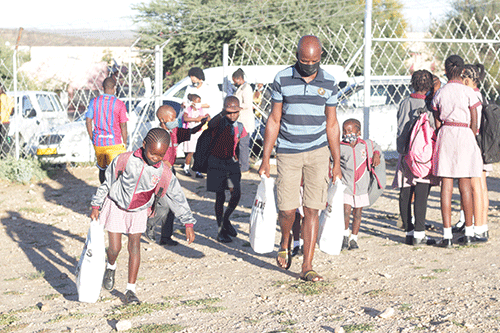In pursuit of access to education for all, government has reiterated that no learner may be denied progress to the next grade or placement at a school for non-payment of voluntary contributions.
However, the ministry of education is of the conviction that the introduction of the primary and secondary education grants did not eliminate the moral obligation and responsibilities of parents and guardians towards their children who are attending school.
“Parents and guardians are still at liberty to contribute, albeit voluntarily, towards the upkeep, maintenance and improvement of schools,” education minister Anna Nghipondoka said in a ministerial statement in parliament this week.
She clarified that free education means that the ministry employs qualified teachers, provides the infrastructure in the form of classrooms, and libraries and learning support materials.
She said other major cost drivers in this provision of access to fee-free education are the government hostels, catering for hostel meals, school-feeding programmes, support to the community hostels, as well as certificate examinations. Although education in Namibia has always been free, according to the minister, the introduction and implementation of the school development fund (SDF) seems to have been working in contravention of the constitutional provision of free education due to the non-adherence of regulations at some schools.
As a result, the ministry introduced access to fee-free education at the primary level in 2013.
This was due to a study done in 2010 which revealed that the payment of SDF was a barrier to accessing education for many learners.
“That means non-payment of SDF resulted in learners being sent home, and those learners who were aware of their unfavourable socio-economic circumstances would usually drop out of school, or simply not enrol in school,” she added.
In addition, the government also introduced the universal primary and secondary grants after abolishing SDF.
This grant funding gives a per capita amount to the schools, which was previously N$400 per learner per annum for pre-primary and N$500 for secondary learners, to continue smooth operations.
Despite these provisions from the government, over the years there has been an increase in the number of learners, coupled with the dwindling resources, and therefore the per capita allocations became smaller.
In this current financial year, approximately N$200 was allocated per primary learner, while N$300 was allocated for a secondary learner, amounting to N$152 366 772 spent.
On top of the school grant funding, the ministry also disburses funds to schools for the procurement of stationery.
In the current financial year, N$51 339 383 was made available to regions for the procurement of stationery.
Despite these allocations to ensure free access to education, Nghipondoka noted that the money is not enough to cater for all the needs as planned.
“With the ever-increasing prices, schools are not insulated against such economic adjustments. Thus, even with their best efforts, schools will find it difficult to survive and meet all the needs of the school based on the grants alone,” she said, adding that there are instances where parents, through their school boards, are required to contribute to an array of needs at their schools.
She, however, warned school principals that it is the government’s policy to offer free education, but getting a contribution from parents should be done in such a way that no Namibian child is excluded. “Whatever inhumane and embarrassing way of treating parents and learners is condemned by the ministry,” she stressed.
The minister further encouraged regional directorates to ensure internal efficiency in the distribution of stationery to schools in terms of timely delivery. - ashikololo@nepc.com.na


